Municipal Climate Action Plans From Around the US
Below is a collection of exemplary Climate Action Plans from around the United States. This is not a comprehensive list, but rather an aspirational collection of best practices. Please note that not all strategies in these Plans are applicable in Wisconsin, based on variance in state laws and practices.
Climate Action Plan – adopted April 2020
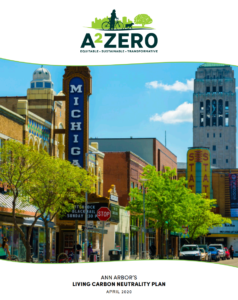
Summary: Ann Arbor includes equity as one of three overarching values – Equity, Sustainability, & Transformation – defining its Plan. Their stated goal is carbon neutrality with 100% renewable energy by 2030, and each strategy includes a section describing “Equity Impacts.” There are challenges to implementation, however. Community Choice Aggregation is a major strategy but is not legally permitted in Michigan. The plan is expected to cost $1 billion, but there is no consensus on a funding plan and the pandemic has impacted revenue.
Definition of Equity: Ensuring everyone gets what they need to succeed based on where they are and where they need to go, and does not disproportionately burden out low-income, minority, and frontline populations.
Equitable Processes/Community Engagement: Hosted 68 public events focused on engaging underrepresented constituencies and leveraging partner networks.
Equity Metrics/Energy Burden: By 2028, all of the city’s Office of Sustainability’s programs have an equity focus.
Climate Action Plan – adopted 2012, updated 2022
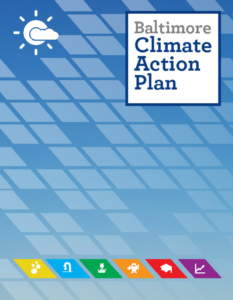
Summary: Baltimore’s Climate Action Plan was updated in 2022 “with a focus on integrating equity and resilience lenses” and “developing a deep community engagement process to educate and elevate the visions of traditionally underrepresented residents of Baltimore City so the new Plan can be as relevant, actionable, and inclusive as possible.” The Plan includes details about the process of its development, though unfortunately energy burden is not specifically addressed.
Definition of Equity:
Equitable Processes/Community Engagement: Created a 22-member Advisory Committee, and working groups for building energy, land use & transportation, growing a green city, and adaptation. Both included residents and advocates to develop strategies that are relevant and feasible.
Equity Metrics/Energy Burden: None identified.
Climate Action Plan – adopted 2009, updated 2022
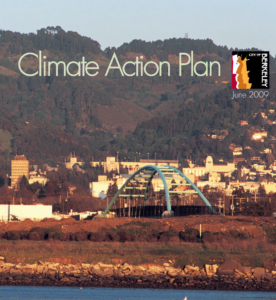
Summary: The Berkley Climate Action Plan was originally written in 2009 before being updated in 2022. It calls for a climate equity action fund to provide climate and resilience benefits to low-income residents for building and transportation electrification. While there is a statement acknowledging racial inequality in the Resilience Strategy section, there is no other equity language in the Plan with the exception of providing energy efficiency programs for low-income households.
Definition of Equity: Equity Guardrails (2022 report) – access to health, safety, and mobility benefits; access to economic benefits; ease of participation; housing affordability & anti-displacement
Equitable Processes/Community Engagement: In forming the draft, series of community events and public workshops where either a booth or a presentation with a climate action component were held. After a draft was release, another round of community workshops was hosted by the Office of Energy and Sustainable development, with additional events by Sierra Club, League of Women Voters, Livable Berkeley, and the Bicycle Friendly Berkeley Coalition.
Equity Metrics/Energy Burden: Climate Equity Action Fund established in 2021 with $600k for building and transportation electrification for low income residents.
Climate Action Plan – adopted 2021
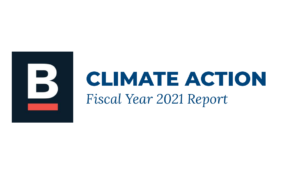
Summary: While the Boston Plan addresses a number of equity concerns, it does not explicitly state how racially and socio-economically diverse groups were included in the planning process.
Definition of Equity: 1. People of color and low-income communities must not be disproportionately impacted by climate hazards. 2. Benefits from climate mitigation and preparedness efforts should be shared equitably among all people.
Equitable Processes/Community Engagement: Outreach materials and events offered in multiple languages 2019 version was shaped by a community working group that included over 60 organizations. The plan supports investments in facilities that serve low-income communities during grid outages.
Equity Metrics/Energy Burden: 2019 version includes a “Designing for Equity” section for each action that includes ideas and principles for equitable implementation.
Community Climate Action Plan – adopted 2021
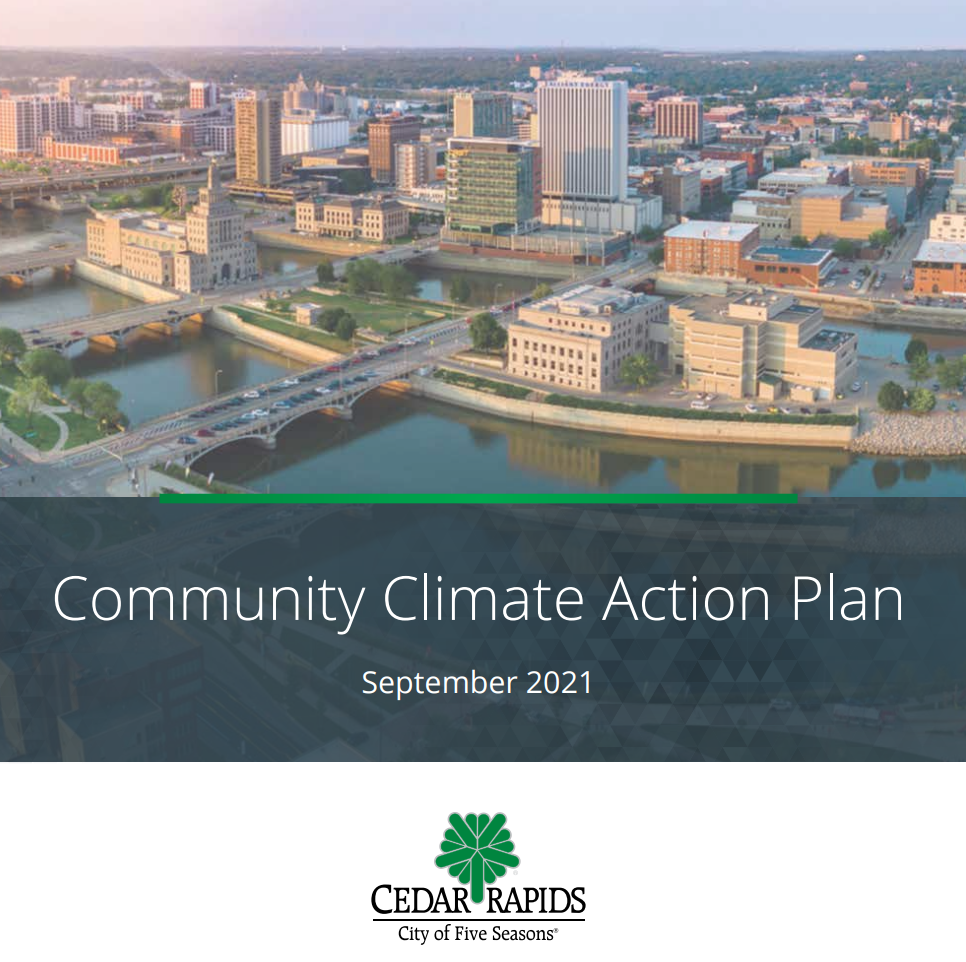
Summary: Cedar Rapids used the Center for Disease Control’s definition of vulnerability that accounts for socioeconomic status, household composition and disability, minority status and language, and housing type and transportation. However, some Action Items do not include details of how to achieve objectives or what metrics will be used to evaluate success, and many Action Items do not have funding sources identified.
Definition of Equity: Developing understanding and partnership with vulnerable residents who are under-representated and under-resourced, and making residents with vulnerabilities central to the planning and decision-making processes and outcomes.
Equitable Processes/Community Engagement: Building the plan involved a Community Climate Advisory Committee made up of 13 residents that guided the development of the Plan. Stakeholder focus groups, neighborhood group teams, and open houses were also activated. Public surveys were used for more specific input.
Equity Metrics/Energy Burden: Each Action Item has a specific equity, environment, economic outcome articulated.
Climate Resilience and Urban Opportunity Plan – adopted 2015, updated 2018
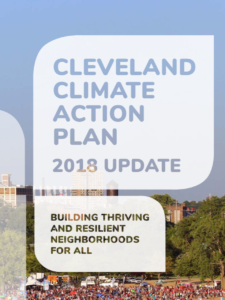
Summary: The Cleveland Climate Action Plan includes a racial equity tool. Every focus area is approached with an equity lens and includes actions that are related to equity. Many areas are identified as “cross-cutting” that blend into traditional categories.
Definition of Equity: Developing understanding and partnership with vulnerable residents who are under-representated and under-resourced, and making residents with vulnerabilities central to the planning and decision-making processes and outcomes.
Equitable Processes/Community Engagement: 12 community workshops over 6 months. Using crowd-sourcing platform ioby (in our backyard) and Climate Action Fund grants to support resident projects.
Equity Metrics/Energy Burden: Occurrences of vacant land and illegal dumping, access to quality, affordable and healthy food, programming needs to help residents save money on energy costs, gaps in connecting residents to industries where green jobs are most likely to be found, safety issues related to transportation, mobility, and parks, and youth engagement and the role of education in climate change.
Climate Action Plan – adopted 2018, report 2020
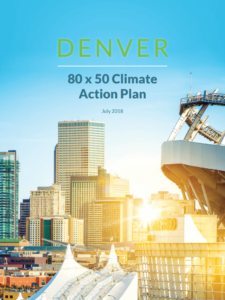
Summary: Denver’s Climate Action Plan includes a timeline and roadmap for achieving climate goals, as well as detailed and forward-thinking funding recommendations. However, it lacks a plan for implementing recommendations from a task force, does not include nature-based solutions, and does not fully address economic opportunities and affordable housing.
Definition of Equity: Equity means addressing broken systems connected to racial injustice and historic inequity.
Equitable Processes/Community Engagement: Task Force participated in equity training to guide values and principles found in recommendations.
Equity Metrics/Energy Burden: None identified.
Climate Action and Resilience Plan – adopted 2018
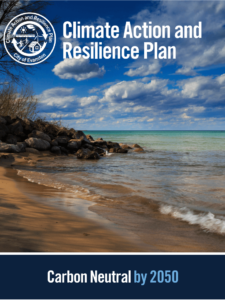
Summary: The Evanston, IL Climate Action Plan lists “equity-centered” as one of three guiding principles. The Plan is strong on outreach and engagement and is notably inclusive of community members, though it does not specify who was involved in the planning process. The Plan lacks specific details for strategies and tactics related to implementation, does not include costs or funding, and does not address economy and affordable housing.
Definition of Equity: In the absence of a City definition of equity-centered, guidance will be sought from external leaders within the urban sustainability and equity fields throughout implementation of the plan. By following an equity-centered approach, the City seeks to achieve environmental justice for all its community members, which includes fair treatment and meaningful involvement with respect to environmental decisions and policies, regardless of race, color, national origin or income. (Language taken from the USDN Guide to Equitable Community-Driven Climate Preparedness Planning).
Equitable Processes/Community Engagement: Pursue utility investments and benefits for Evanston residents, particularly those that benefit low-income residents. 1. Identify current and future vulnerable populations. 2. Conduct targeted outreach with vulnerable populations to understand their needs and how the City can best assist them in preparing to meet those needs. 3. Assess City infrastructure and prioritize support for properties that provide services to vulnerable populations to ensure they are accessible. 4. Establish a protocol for providing assistance to populations that may face financial strain caused by climate hazards, such as higher utility bills, and identify funding sources to support those populations. 5. Investigate building improvement programs that would reduce energy consumption through added insulation, air sealing, passive energy systems, and higher efficiency equipment. 6. To buffer low-income residents from fuel price spikes, support alternative transportation modes such as transit, biking, and walking. Support renewable energy sources to provide resilience to energy price spikes. 7. Adopt an environmental justice ordinance, building on the work of Environmental Justice Evanston and the Equity and Empowerment Commission.
Equity Metrics/Energy Burden: Aims to Adopt an environmental justice ordinance, building on the work of Environmental Justice Evanston and the Equity and Empowerment Commission
Climate Action and Adaptation Plan – adopted 2018
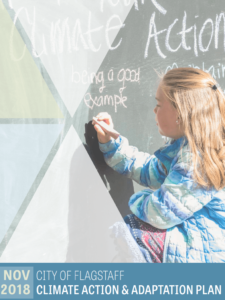
Summary: One of the three overarching goals for the Climate Action Plan for Flagstaff, AZ is to address climate change in a manner that prioritizes those most impacted and ensures the costs and benefits of climate adaptation and mitigation are equitably distributed. It includes a section called “Operationalizing Equity” with action items and checklists.
Definition of Equity: Considering social equity when addressing climate adaptation involves looking at communities’ existing disadvantages and ensuring those most at risk are protected. Inequity in our society means that some individuals are better able to respond to change—or stressors —than others. For example, those with lower incomes may have to make difficult choices between paying for heating or meeting other basic needs and may not have access to quality healthcare. In Flagstaff, low-income communities are disproportionately communities of color, specifically Hispanic and Native American households. The elderly, undocumented migrants, or people from families with mixed immigrant status are less likely to leave their homes to seek aid. This Plan seeks to identify and support disadvantaged communities that may have more trouble adapting to change.
Equitable Processes/Community Engagement: This Plan was written with the community, for the community, through an extensive year-long community and stakeholder engagement process that included: Six public open houses attended by over 300 community members; Three online surveys taken by over 250 community members; Meetings with local organizations and neighborhood groups and collaborations with Coconino County representatives; A 15-member citizen steering committee that provided input and feedback throughout the planning process; Workshops and meetings with technical experts, including 30 City staff across divisions, to vet and evaluate plan targets, strategies, and actions.
Equity Metrics/Energy Burden: Nine equity considerations will guide the implementation of climate actions and ensure that participation in climate action is accessible to the entire Flagstaff community. Staff will work to establish partnerships with underserved communities, build capacity for climate leadership across the community, and involve diverse community voices from the start of any program.
Climate Action and Adaptation Plan – updated 2020
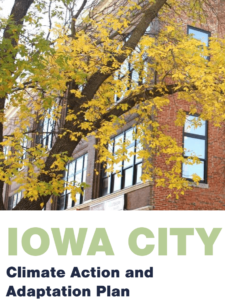
Summary: Iowa City updated their Climate Action Plan in 2020. It includes social equity as a guiding principle for every focus area, and the engagement process was well-received. However, the Plan lacks clear tactics and metrics for recommended actions and does not specifically address just economy, social cohesion, or innovative financing.
Definition of Equity: Inclusion and input of all communities and the fair distribution of benefits.
Equitable Processes/Community Engagement: Includes guidance for focused equity review of proposed climate actions.
Equity Metrics/Energy Burden: reduced poverty, improved connectivity of neighborhoods and public transportation, strengthened housing infrastructure, decreased economic concerns for cost-burdened households, and reductions in unemployment.
Equitable Climate Action Plan – adopted 2020
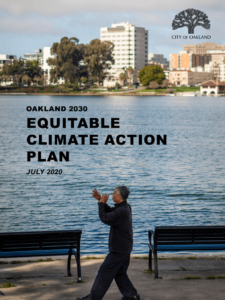
Summary: The City of Oakland has a strong Climate Action Plan with a special section that addresses health, housing, food, and jobs. Each section of the Plan includes a sub-heading for “Centering Equity.”
Definition of Equity: Strategies are structured to maximize benefits and minimize burdens on frontline communities; prevent displacement; and respond to community priorities and values, addressing disparities in resource allocation and local vulnerability.
Equitable Processes/Community Engagement: Equity Facilitator consultant hired to co-lead community engagement efforts. Includes “Community Engagement and Outreach” appendix. Includes “Equitable Implementation” appendix.
Equity Metrics/Energy Burden: Racial Equity Implementation and Assessment Guide
Climate Action Plan – adopted 2015
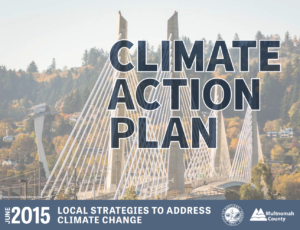
Summary: Portland, OR adopted a Climate Action Plan in 2015 that includes an equity lens and six Equity Objectives, as well as an implementation guide to support city and county staff on best practices and tools for integrating equity into their work. Strategies and actions to advance equity and reduce disparities are highlighted in the chapter narratives, as well as called out explicitly in several key actions. In addition, actions with a significant opportunity to advance equity are identified with an “E” icon. One drawback is that the Plan offers little in the way of funding or financing options.
Definition of Equity: Equity is when all individuals have access to the opportunities necessary to satisfy their essential needs, advance their well-being and achieve their full potential. Climate Equity ensures the just distribution of the benefits of climate protection efforts and alleviates unequal burdens created by climate change.
Equitable Processes/Community Engagement: $30,000 for equity/community engagement process,Equity Working Group.
Equity Metrics/Energy Burden: The Equity Implementation Guide provides a framework for measuring equity in the implementation of actions, but staff were not able to develop equity indicators or metrics during the planning period. Instead, this became an action of the plan.
Climate Action Plan – components adopted 2018, 2019, 2020.
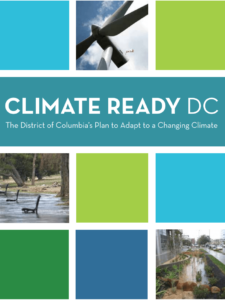
Summary: Washington D.C.’s climate planning process is made up of several components. Clean Energy DC (2018) redines energy systems, Sustainable DC (2019) focuses on health and livability, Resilient DC (2020) evaluates effects of evolution and climate changes, and a Mitigation Plan and Comprehensive Plan are forthcoming. Thus far, the plans reflect a strategy for extreme weather resiliency and do not offer much in the way of emissions reduction.
Definition of Equity: “The achievement of racial equity is when race can no longer be used to predict life outcomes, and outcomes for all groups are improved.” (as defined by the Government Alliance for Race and Equity) the practice of providing equal access to opportunity and services, or equal possession of basic needs.
Equitable Processes/Community Engagement: “To ensure the goal of providing equitable access to services, resources, and economic opportunities remains at the forefront of this and future initiatives, DOEE will convene a group of diverse community stakeholders and city leaders to guide the equitable implementation of Climate Ready DC. ” Hold two neighborhood meetings on energy planning and equity to allow communities, especially those that are vulnerable and highly impacted, to define success.
Equity Metrics/Energy Burden: Green job creation for middle and lower income families, financially unburdened, accessibility- a guide is created to launch and administer equity advisory groups, Solar for All programming is targeted to low-income families.